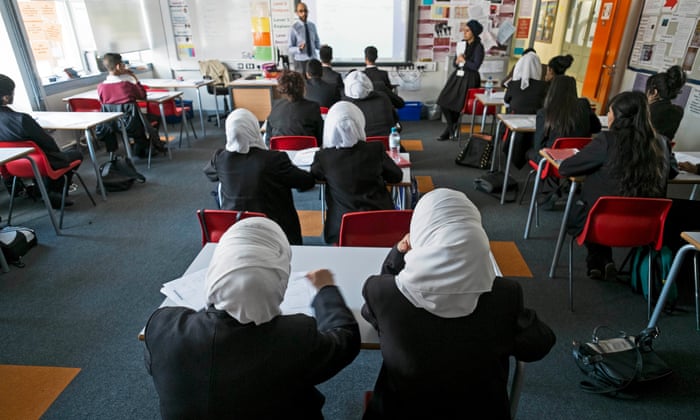
Park View academy in Birmingham gave children the gift of attainment – those who trashed its reputation do not appreciate the cost of what has happened. Photograph: David Sillitoe for the Guardian
In 2014 the so-called Trojan horse scandal broke in Birmingham, when it was said that a group of hardline conservative Muslim governors and teachers had set out to systematically take over and “Islamify” state schools. At the heart of the lurid headlines was the Park View academy trust. For years, the school had effectively served a local Muslim community and successfully modelled an approach to education that had transformed academic attainment. It was so successful that it was encouraged to become an academy, take over nearby schools and extend its model, becoming responsible for three schools, with further expansion planned. Then, suddenly, instead of being lauded for its approach, it was condemned.
Over the past three years some of Park View’s teaching staff have faced allegations of unacceptable professional conduct before the teacher regulator and there has been a series of misconduct cases. As a barrister I represented some of those involved. What those of us who defended staff members sought to demonstrate was that all Park View did, including having a prayer club and, yes it’s true, playing a call to prayer on loudspeakers, was consistent with government guidance [pdf] and accepted practice. The same practices lauded in 2012 for engaging pupils were now being cited as evidence that something was badly wrong.
In May, teachers at the centre of the allegations were told that the conduct of the case against them was so bad that it would undermine public confidence in the regulatory process to publish any decision. The process was damaging for all concerned and has had no outcome.
When I took on these cases I had to overcome my own preconceived notion that a non-faith school should be a secular space. I attended two entirely secular state secondary schools. No prayers were said and assemblies, if they took place at all, were a series of notices followed by a song, not a hymn. To my mind, only faith schools “did God”.
Peter Clarke, the former counter-terrorism police officer appointed by the government to investigate the goings on in Birmingham, seems to have shared my mistaken assumption. In his report the word “secular” is used to describe the educational space one would expect in a non-faith British state school. This mistake informed his whole approach to the central question: was there too much religion in the schools he was scrutinising?
After the publication of the Clarke report, the then secretary of state for Education, Michael Gove, led a debate in the Commons. He repeatedly emphasised that these were “secular” schools: “At one secular secondary school, staff told officials that the call to prayer was broadcast across the playground on loudspeakers … At another secular secondary school, inspectors described “a state of crisis”.
Prompted by this, MP after MP stood up to condemn this pernicious invasion of Islamic practice into secular space.
The truth, presumably known to Gove, is that there is no such thing as a state secular school in England. This position was set out succinctly in the evidence of Dr Marius Felderhof, of the standing advisory council on religious education, responsible for oversight of collective worship in state schools. At the regulatory inquiry he reminded the panel that every state school, including non-faith schools, must place at its heart an acknowledgment of the divine.
Gove must know that it has been a requirement in law since the 1944 Education Act for every child in every school to participate every day in an act of collective worship. Current guidance begins with a preamble: “The government is concerned that insufficient attention has been paid explicitly to the spiritual, moral and cultural aspects of pupils’ development, and would encourage schools to address how the curriculum and other activities might best contribute to this crucial dimension of education.”
On collective worship we are told: “Collective worship in schools should aim to provide the opportunity for pupils to worship God, to consider spiritual and moral issues and to explore their own beliefs; to encourage participation and response.”
This was all presumably known by Gove. Yet the parliamentary debate was led on the basis that what had happened in Birmingham was unacceptable in “secular” schools. It may be that this arose from incompetence or misunderstanding but I suspect Matthew Parris got it right in 2014 when he said of Gove: “Something in his brain flips when Islamic extremism is mentioned.”
In my view, this damaging misrepresentation of the facts cast a pall over the entire regulatory process and poisoned the public debate about what had happened in Birmingham. It featured in the debate from the outset and was reinforced by the secretary of state for education. That perception has never been corrected.
What has the Trojan horse affair achieved? Have great swaths of British Muslim children been saved from a path that leads inexorably towards terrorism? Well, no. Because they weren’t on that path in the first place.
It is easy to say we must not pander to extremism and it must be challenged at all costs. Saying it has political benefits – but also societal costs. Those who say this choose not to understand that the Park View culture was one of challenge. Pupils were encouraged into school with the reassurance that their faith and their culture would be respected. Once there, and engaged in education, they were challenged. Park View pupils stood on stage and performed with Pink Floyd, they stayed at Russell Group universities, they sailed yachts on the Norfolk Broads. Best of all, Park View pupils were given the gift of educational attainment.
Those who spout the easy words do not appreciate the cost of what has happened. A successful approach to achieving engagement with mainstream education by the more socially conservative members of our society has been trashed. The successor school to Park View, Rockwood, has a different approach to integration and British values – for example, it has introduced a cadet force.
Home schooling is on the rise. Those parents who were anxious that their child’s religion and culture should be afforded proper space and respect at school may have withdrawn them from state education. Park View had developed a system that reached out to a conservative Muslim population and drew them into participation in wider society. Those from the most conservative backgrounds are now at risk of being driven back to home schooling and the madrasa.
This is the true cost of the populist simplistic message put out by politicians – we are driven further apart at a time when what we need most is to forge friendships and understanding across our multicultural society.
[“Source-theguardian”]



